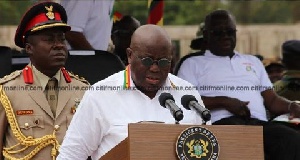- Home - News
- TWI News | TV
- Polls
- Year In Review
- News Archive
- Crime & Punishment
- Politics
- Regional
- Editorial
- Health
- Ghanaians Abroad
- Tabloid
- Africa
- Religion
- Election 2020
- Coronavirus
- News Videos | TV
- Photo Archives
- News Headlines
- Press Release
Opinions of Tuesday, 12 December 2017
Columnist: Baffo Gyasi Gideon
Thank you Nana Akufo-Addo
I want to join the people of Ghana who are rejoicing now due to the timely intervention of Nana Akufo-Addo’s led government’s introduction of free Senior High School education nationwide.
Gone were the days where attending Senior High School was thought of as a ladder which can only be climbed by the rich and wealthy in society.
High admission requirements including huge admission and feeding fees made secondary education inaccessible to the poor. This great achievement by Nana Addo cannot be swept under the carpet since the NDC and their leader in 2012 and 2016 ex-President John Dramani Mahama, claimed the policy was an impossibility.
Education is the bedrock for social and economic development of any country. It takes ages to transform a nation into a developed and a prosperous one; this cannot be achieved without education.
Nelson Mandela, the African president of South Africa said, “Education is the most powerful weapon which you can use to change the world”. Literacy is indeed important but, there are several factors which need to be seen in order to get the desired results.
Can the good people of Ghana imagine what would have happened to the over 120,000 Ghanaian youths that would have dropped from school if the Free SHS had not been implemented? What are the policies that the government has put in place for the benefiters of the free SHS policy who are unable to continue to the highest educational level after SHS due to one reason or the other? We cannot deny the fact that financial constraints and current economic hardship are obstacles that are obstructing the enrollment of students in the existing tertiary institutions especially in this era where free tertiary education has not yet being promised by our political leaders.
As stated by Albert Einstein, “Everybody is a genius. But if you judge a fish by its ability to climb a tree, it will spend its whole life believing that it is stupid”, it would be worth stating that initiating policies with the intention of making formal education accessible to the youths in the country without taking into account the less academically endowed is completely inappropriate.
What about the class of people who are more endowed in technical skills than academic knowledge? The mere fact that majority of Ghanaian youths are currently having access to free basic and secondary education does not completely guarantee Ghana’s socio-economic development.
Moreover, formal education should not be regarded as the only asset for national development but also helping the youths to develop upon their god giving talents, skills and potentials aimed at taking Ghana to the highest level in social and economic development.
The inability of Ghana’s educational system to train youths with technical skills and those from financially challenged backgrounds has resulted into youth joblessness (unemployment) and increasing incidence of social ills among the youths such as prostitution, arm robbery, internet fraud, etc in their quest to earn a living for themselves.
This call for immediate and urgent revision of our senior high school educational system to ensure that a considerable number of active and exuberant youths are massively equipped with requisite skills and training.
Though the standards of education in Ghana have improved in recent years, there is still shortage of vocational and technical opportunities. Most of the focus in Ghana’s education sector has been driven towards academic subjects (read, write and arithmetic only).
In a country like Ghana where most people cannot afford tertiary education, it is important that the set up vocational and technical training institutions and avenues. The success of every country’s economy is based on employment competitiveness. The skill of the labor force is essential to economic growth.
An improvement in the technical and vocational field will provide employment for the youths, generate revenue for the government, enhance production in our local industries and improve the country’s overall economy.
In addition to the establishment of vocational and technical schools, the Ministry of Education in collaboration with the Ministry of Local Government and Rural development can dialogue and adopting indigenous curriculum education into our academic syllabus which will serve as an avenue for the youths to acquire skills and training developing our local industries.
Acquiring knowledge in indigenous technology such as soap making, beads making, kente weaving, basketries, batik making, etc in addition to the academic knowledge will enable the youths (especially benefiters of the free education policy who are unable to afford tertiary education) to acquire skills to work effectively in our local and rural industries to add more value to our locally manufactured products.
In conclusion, I fervently believe that if the government makes it a point to establish more technical and vocational institutions and adopt indigenous curriculum into our academic syllabus in addition to our already existing educational policies, the educational sector will be more better off and develop in a desirable manner to make the Ghanaian youth not a liability but rather a valuable asset and instrument of positive change for national development.











